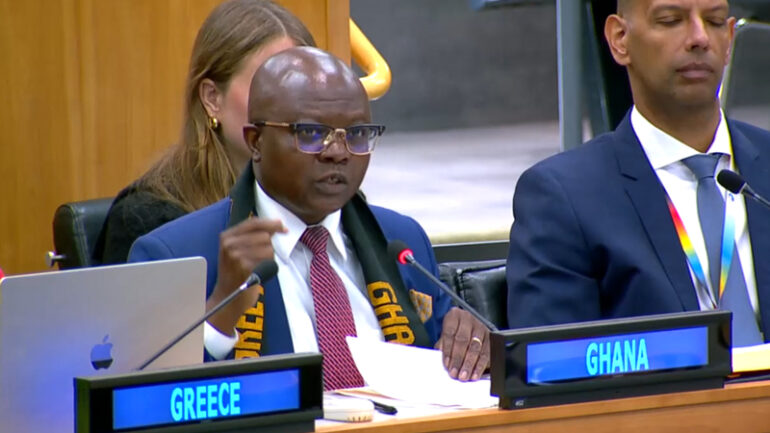Second Committee, 2nd plenary meeting – United Nations General Assembly, 80th Session

- Posted by admin
- Posted in News, Plenary, Second Committee
Jeswuni Abudu-Birresborn
Minister Plenipotentiary
And Second Committee Expert
United Nations HQ
New York, October 6th 2025
GENERAL DEBATE OF THE SECOND COMMITTEE AT 80TH SESSION ON THE THEME: FIVE YEARS TO 2030: MULTILATERAL SOLUTIONS FOR SUSTAINABLE DEVELOPMENT
Mr. Chair,
Excellencies,
Ladies and Gentlemen,
Ghana aligns herself with the statements delivered by the G77 and China, and the African Group.
We speak at this moment in our national capacity and I take this opportunity to congratulate you, Ambassador Dibba, on your election as Chair this Committee. To you and your Bureau, we offer our heartfelt felicitations and our full cooperation.
We also wish to express our sincere appreciation to the Chair and other members of the Bureau of the 79th session for their leadership.
Mr. Chair,
Three months after Seville, a decade since Addis, and with only five years left to achieve the 2030 Agenda, three truths stand before us, clear and undeniable. First, the global financing gap for sustainable development is widening, hurtling toward 6.4 trillion dollars by 2030. Second, the actual flows to bridge that gap are shrinking. And third, while our world cries out for schools, for hospitals, for clean energy, for food and for jobs, last year alone, 2.7 trillion dollars was poured into the machinery of war.
These figures speak louder than any speech. They cry out with a voice of judgment. They reveal not just a policy failure, but a moral crisis. Humanity is spending more to destroy than to build, more to divide than to unite, more to feed the engines of conflict than to nourish the roots of peace.
And unless we change course, peace will remain fragile, and development will remain deferred.
Mr. Chair,
This is not a failure of ideas nor is it a failure of proposals. It is a failure of trust. A failure of credibility. A failure of will. Too often, global cooperation has been rich in promises but poor in delivery. Too often, commitments have been written on paper but never written into practice.
Those of us from developing countries live the reality of this betrayal every day. We see it in our struggle against climate change. We see it in the long-awaited Loss and Damage Fund, which still awaits the lifeblood of financing. And so we must name the uncomfortable truth: the Global North has given the Global South a cheque that has come back stamped “insufficient funds.”
But hear this: we refuse to believe that the bank of solidarity is bankrupt. We refuse to believe that humanity cannot afford justice. We refuse to accept that promises made in the light of hope must forever remain empty pledges.
The same is true of development financing. Official Development Assistance remains unmet. Here too, the cheques of solidarity continue to bounce. Each broken commitment erodes trust and weakens the very foundations of multilateralism.
Mr. Chair,
We are not asking for charity. We are demanding justice. We call for fairness in trade. We call for justice in taxation, anchored in the UN framework Convention on international tax cooperation. We call for reform of the global financial architecture and for relief from the crushing weight of debt. These are not pleas from the weak; they are demands for equity from those who believe in a just and equitable world order.
Mr. Chair,
Before I conclude, allow me to recall an image from Ghana’s own heritage: the Kente cloth. Handwoven, colorful, and strong, it is a tapestry where each thread, no matter how small, holds meaning and power. Alone, a single strand cannot endure. But woven together, each thread affirms and strengthens the other, producing beauty, resilience, and unity.
This Committee must be our Kente cloth. Each nation, large or small, is a vital thread in the fabric of global cooperation. And just like that cloth, we must remain tightly bound by our shared values: justice, solidarity, and equity.
Five years remain before 2030. Five years to prove that multilateralism can still work. Five years to transform promises into progress. Five years to bend the arc of history toward sustainable development.
So, we must come together, developed and developing countries alike, to weave a garment of global solidarity that future generations will wear with pride.
Mr. Chair, the time for words is over. The time for action is now.
Thank you
